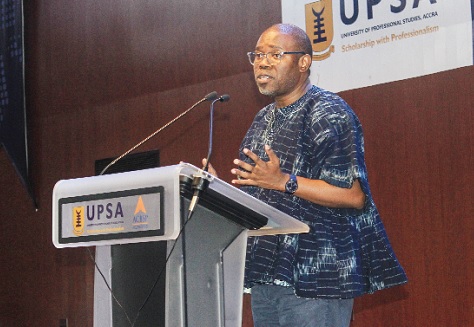
Solving infertility with technology: Varsity don raises ethical issues
Technologies for engineering humans through man-made wombs have been identified as a solution to the growing infertility rate in Africa.
The Vice-Chancellor of the University of Johannesburg, Prof. Letlhokwa George Mpedi, however, said in the 21st century, there were ethical and legal implications of reframing the creation of humans that needed to be addressed to make adaptation efficient.
He was speaking at a public lecture organised by the University of Professional Studies, Accra (UPSA), under the auspices of the Office of the Vice-Chancellor in Accra last Friday.
The lecture was on the topic: “Artificial Reproductive Technology: Ethical and Legal Considerations through an African Prism”.
Prof. Mpedi said research suggested that Africa’s constantly and rapidly changing lifestyle was fundamentally impacting fertility, adding that infertility had emerged as a medico-socio-cultural challenge.
He said there were also challenges in the cultural, religious and societal perception of infertility and its treatment, which was pervasive in many parts of Africa.
Limited knowledge
That, Prof. Mpedi said, was largely the impact of limited knowledge of the public, patients and even healthcare providers in some cases.
“The continent also has a higher prevalence of sexually transmitted diseases, postpartum and post-abortion infections, which contribute to both male and female infertility.
At its core, infertility is a human rights issue that demands attention.
“In recent years, there has been remarkable progress in the field of reproductive technologies.
These technologies include medical procedures used primarily to address infertility.
“As we venture into our own ‘brave new world’, we must do so with a framework in place.
We find ourselves in the midst of the fourth industrial revolution, defined by great disruption to technology, industries and society, which calls for changes to policy and our approaches,” he said.
Prof. Mpedi said the adaptation to those technologies, while helpful and timely, would require the legal fraternity to keep up with developments in the space and respond accordingly.
He mentioned the technologies to include ectogenesis, the process of growing a foetus outside of the human body, which he said could help those who could not get pregnant and could save the lives of premature babies.
Ethical frameworks
While there were broad ethical frameworks in place, Prof. Mpedi said -African countries needed to get more specific legal and ethical frameworks as those technologies shifted from theory to practice.
He said the World Health Organisation (WHO) reported that around 300,000 deaths happened due to pregnancy complications while premature babies born earlier than 22 weeks had no hope of survival.
“This technology certainly represents an exciting new frontier for pregnancy and for those seeking alternative routes to conception.
“However, if this is to be an enduring reality, we must ask the difficult legal and ethical questions and perhaps begin to consider our responses,” he said.
Prof. Mpedi said ethically, there were concerns that the technology went against the very process of human procreation.
“For example, as we research further into the field and consider human subjects, does this technology satisfy the four principles of bioethics: autonomy, beneficence, no maleficence, and justice?
“From a legal standpoint, currently, there are limited ethical conditions and human embryos can only be grown for 14 days.
The 14th day is the point at which a spherical embryo starts to form a body and when cells begin taking on characteristics.
“With more research and acceptance of this process, how will the law adapt?
Firstly, pregnancy laws will need to be reformed.
We also have to consider how we approach abortions, for instance.
Could this technology be used to amend abortion laws?” he said.
Gene editing
He also mentioned gene editing as one of such technologies to be considered and said it involved the alteration of DNA through removal, insertion or replacement in the human genome, with the potential to combat genetic disease or optimise health.
He said already, it had been established that gene editing could treat sickle cell disease effectively.
“Similarly, embryo donation or adoption — the legal adoption of embryos that have been donated and frozen by families who have undergone in-vitro fertilisation (IVF), a technique in which an egg is removed from the woman's ovaries and fertilised with sperm in a laboratory — should also be considered.
This represents a new frontier for adoption.
There are some similarities between embryo adoption and infant adoption,” he said.
Writer’s email:
